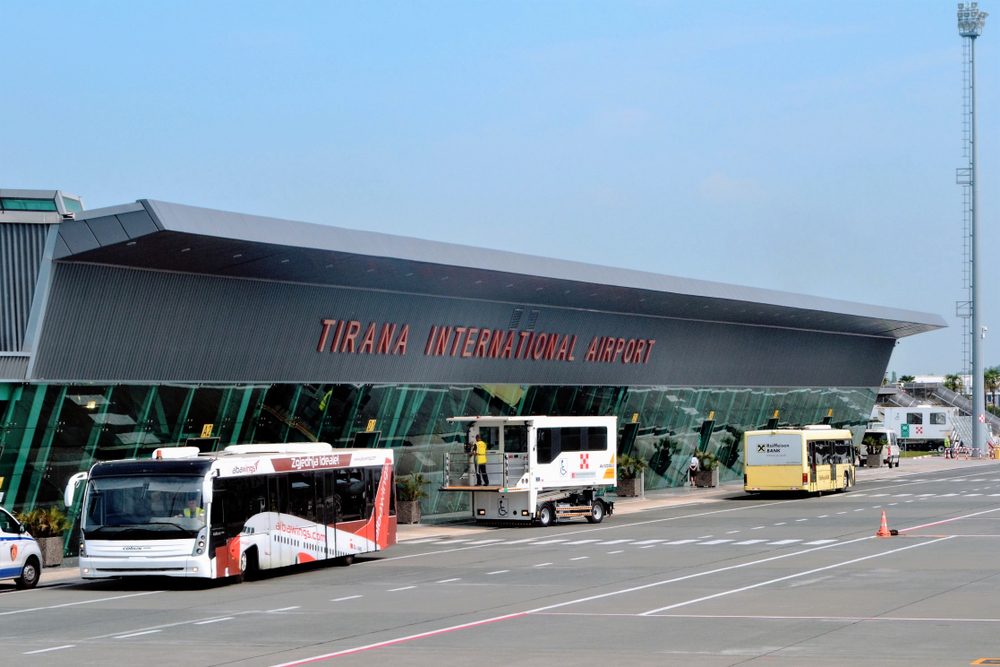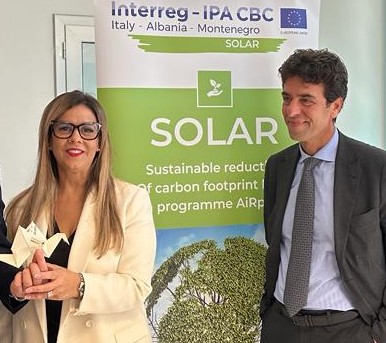
Tirana International Airport © PaulSat/Shutterstock
An Interreg cross-border cooperation project to reduce CO2 emissions at all levels, from aircraft engines to plastic consumption on the ground, has produced a practical handbook. We interviewed two of the main managers, Anita Maurodinoia and Vito Antonio Antonacci
Two years of dialogue and research, exchange of good practices and moments of discussion: throughout 2022 and 2023 the airports of Puglia, Albania and Montenegro were laboratories for experimentation on greenhouse gases thanks to the project Interreg SOLAR , Sustainable reduction Of carbon footprint Level in program AiRports. The project involved Puglia Airports, Montenegro Airports, the Albanian Civil Aviation Authority and the Molise Regional Development Agency, and was coordinated by the mobility department of the Puglia Region, a structure which, as confirmed by owner of the transport and sustainable mobility department Anita Maurodinoia, is already involved in new cross-border cooperation measures, resulting from SOLAR. "With SA-Connectivity for example, we will be coordinators of a project that will have the aim of improving transport overall within the Southern Adriatic area, promoting sustainable, green and intelligent mobility. The aim will be to strengthen maritime safety, develop competitive ports, improve transport networks and promote cross-border transport. We will be busy with that project for 54 months, always with a view to complementarity between partners, again Puglia, Albania and Montenegro".
In working, also in SOLAR, with partners from candidate countries to join the EU, were there any particular difficulties or incidents to report?
Cross-border cooperation allows us to address common challenges more effectively and build closer links between the regions and the actors involved. Our participation in cross-border projects is of fundamental importance, not only for the obvious environmental benefits, but also for the value added that such initiatives bring to the community. And in any case, throughout the life of the SOLAR project, the active participation of the Albanian and Montenegrin partners demonstrated the great desire for Europe in these territories.
How much did you perceive the Balkan partners' need for Europe?
Overall, participation in cross-border projects such as SOLAR offers all international partners the opportunity to share knowledge, experience and resources. This collaboration fosters the exchange of innovative ideas and effective solutions to address environmental challenges. It also allows to learn from best practices adopted by other countries.
By participating in the SOLAR project, Puglia and the various Balkan, but also Italian partners have taken a common step towards environmental sustainability and the harmonisation of policies at a national and cross-border level.
Thanks to initiatives like these, we are building a bridge towards a future and a Europe where environmental sustainability is at the centre of daily actions and decisions made for the good of future generations.
The regional working group, which also involved manager of the mobility infrastructure section Irene di Tria and official head of the SOLAR project Domenico Zonno, was coordinated by the director of the mobility department of the Region, Vito Antonio Antonacci. We asked him how the Apulian airports will change.
The general objective of the project which we led was to measure and reduce the carbon footprint of the Apulian, Albanian and Montenegrin airports. We can say that thanks to this project the airports involved will become "greener" and those who work there, in addition to having greater awareness, will also have acquired good daily practices.
The Puglia Region carried out a training campaign which involved the various actors present in the airport sector, providing them with the skills and tools necessary to implement concrete measures aimed at changing energy consumption trends, efficiency and the significant reduction of CO2 emissions. Furthermore, it created an awareness campaign aimed at the entire airport community to promote a more sustainable and responsible approach towards the environment. This campaign did not just inform about the benefits of reducing carbon emissions, but also sought to create a sense of shared responsibility. Attention was placed on the awareness that every action carried out inside the airport contributes to the well-being of the environment and, consequently, to our own quality of life.
The data collected, however, show that air traffic is significantly more polluting than the airport itself; yet the project sought to reduce consumption and reduce emissions. Is there optimism? How did the other partners react to the conclusion of the project?
The partners produced a carbon footprint report and a low-carbon, low-energy plan, analysing current and future carbon management policies at the airports involved. Additionally, they produced a study on how to achieve neutrality for carbon offsetting.
So everyone acquired useful information to promote awareness, behaviour change and the adoption of sustainable practices, with the aim of reducing carbon emissions at airports. We are convinced that the involvement of airport employees, operators and passengers in information and training activities will guarantee the durability of the project results.
Awareness-raising and training are terms that often appear both in the analyses and in the final proposals of SOLAR. In concrete terms, what are the proposals that could be extended to all airports, and not just those in Puglia, Albania and Montenegro?
The SOLAR project disseminated knowledge on available tools and possible actions to reduce the environmental impact of daily operations carried out by employees, passengers, suppliers and carriers. During this project, various activities were organised to integrate carbon emission reduction objectives into the airports' operational framework. In practice, simple guidelines were provided to employees and operators to save energy during their daily operations, also with reference to personal practices and not just specific operations, and to encourage low-carbon energy planning.
We have encouraged external operators, service companies, airport managers, catering companies, employees, passengers and visitors to use public transport or more sustainable modes of transport, to adopt environmentally friendly waste management policies and to reduce the use of plastic.
As a main outcome of the project activities, the partnership created a joint toolkit for the sustainable management of CO2 emissions at airports. It is the heart of the SOLAR project as it includes the definition and implementation of actions to raise awareness of sustainable and eco-friendly policies in order to reduce the carbon footprint of airports. Concretely, we have drawn up a set of best practices aimed at three distinct groups of interested parties, namely airlines, economic operators and passengers, so that everyone can do their part to reduce CO2 emissions at airports.
Le buone pratiche dei passeggeri
The concrete results of the SOLAR project include a handbook of good practices aimed at airlines, commercial partners and travellers. Passengers are invited to follow 6 tips.
1) Fly responsibly: prefer direct flights, reduce the weight of your luggage and choose airlines committed to reducing emissions
2) Offset emissions: participate in the calculation of your ecological footprint to contribute to the global reduction of greenhouse gases
3) Choose ecological means of transport: to reach and leave the airport, try to reduce trips alone by car by preferring other options (shared trips, public transport)
4) Prefer online check-in: limit paper waste
5) Limit disposable consumption: avoid purchasing disposable water bottles, plastic bags, food and shopping wrappers
6) Choose eco-friendly accommodation: pay attention to "green" practices such as renewable energy, waste recycling, reduction of water use, limitation of plastic use
This content is published in the context of the "Energy4Future" project co-financed by the European Union (EU). The EU is in no way responsible for the information or views expressed within the framework of the project. The responsibility for the contents lies solely with OBC Transeuropa. Go to the "Energy4Future"







 To Top
To Top